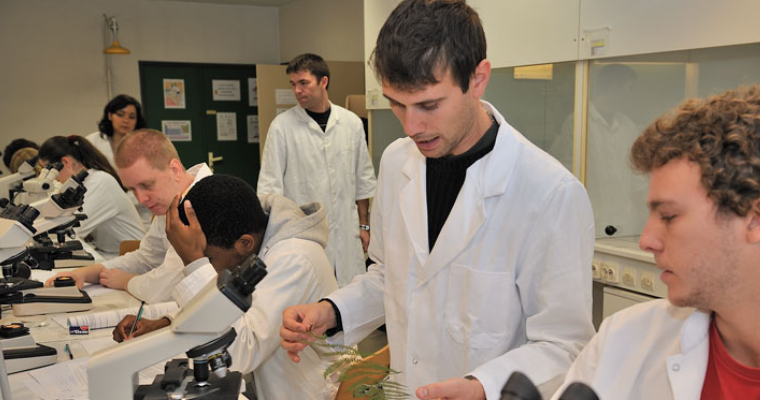TRAINING
TRANSMISSION OF KNOWLEDGE : OUR VOCATION
URCA's AEBB cluster co-constructs and implements training tools, from bachelor's degrees to doctorates, adapted to a rapidly changing world with the future emergence of new, highly qualified professions.
The long-term future of research is guaranteed thanks to training through research at the ABIES (Agriculture, Food, Biology, Environment, Healthcare) doctoral school, co-accredited by the University of Paris-Saclay.

URCA’S AEBB-CLUSTER-RELATED TRAINING COURSES
CAREERS IN THE BIOECONOMY, JOBS WITH A FUTURE
The bioeconomy is a major strategic lever for development for all economic players, as it represents an opportunity for reindustrialisation and a competitive advantage conducive to the emergence of promising new sectors in the field of innovation.
However, as shown by the study « Plant chemistry and industrial biotechnologies: which strategic professions ? » produced by UIC PCA (Union of chemical industries of Picardie and Champagne-Ardenne regions), APEC (the French managerial staff employment association) and the IAR (Industries and Agro-resources) competitiveness cluster, its development could be hindered by the lack of interdisciplinary skills. We mention interdisciplinary skills here, since they are characterised by the intertwining of a wide range of expertise and scientific disciplines related not only to the broad diversity of issues in the sector and to the wide range of application markets to which it provides access, but also to the specific nature of plant matter processing, which requires skills different from those required for fossil-derived raw materials.
Such interdisciplinary skills include the traceability and characterisation of plant raw materials, intermediate and finished products, new methods of crop management, control of the environmental effects of agricultural practices, management of variability, mastery of new technologies for the fractionation of biomass from agriculture and product purification, new microbiological and enzymatic methods of converting biomass, in vitro plant cultivation, ecodesign of products and materials, and new methods of waste management and recycling.
Related skills that are just as essential to the development of the sector are also sought after, including multi-criteria analysis of environmental impacts, support for the development of new crops and new practices, and skills in SHS, psychology, economics, and sustainable development management and law at regional level.
The development of training tools adapted to a rapidly changing world is therefore essential, including improved dissemination of knowledge among industry players, researchers and students. It is necessary to prepare for the emergence of these new, highly qualified jobs.